<From Overseas Office> [China] Shanghai Lockdown 2022
- Release date: Apr 27, 2022
- 4853 Views
The Shanghai lockdown has been in the news from time to time in Japan. Shanghai residents experienced a “curfew” two years ago during the early stages of the Corona epidemic, but this may be their first experience, not their second. Last time, they were only able to refrain as much as possible from unnecessary outings; supermarkets and other stores were open, and they were able to go shopping, but this time they are not allowed to leave their homes. Also, in terms of awareness, it is different from the last time. Whereas last time they chose not to go out to protect themselves and their families, this time they have a better understanding of the risks involved, perhaps because they have more knowledge about Corona and have seen and heard news from overseas, and many of them feel they cannot go out even if they wanted to.
The lockdown will be gradually lifted in blocks and apartment complexes, but it is likely to continue in many areas until around the end of the Golden Week holidays. People are not allowed to go out of their houses, but they can go to PCR inspections that will be conducted every few days in apartment complexes and other designated areas. Many businesses are unable to operate normally, and schools have been online for over a month. As of late April, all transportation, including cabs, was suspended. Many stores and logistics operations have either stopped or are operating sporadically because employees are unable to go to work.
The battle for food
This is what the citizens of Shanghai do best on a daily basis. Many people wake up early in the morning each day and begin by struggling with the application. Stores in general sell out as soon as sales start and close today within a minute. It is said that the success rate of ordering on an individual basis is less than 5%. Of course, you will never be able to buy all the items you wanted to buy because they are always sold out.
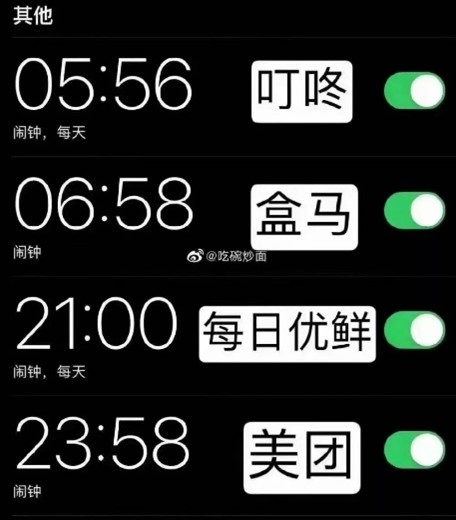
Set alarms according to the timing of orders for various services 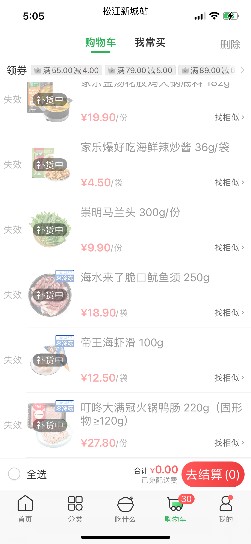
Out of stock immediately after sales start “补货中” Relief Supplies/Rations
Supplies are distributed by the government on an irregular basis, varying from district to district. At the beginning of the blockade, the foodstuffs were minimal, but gradually the supplies became more varied 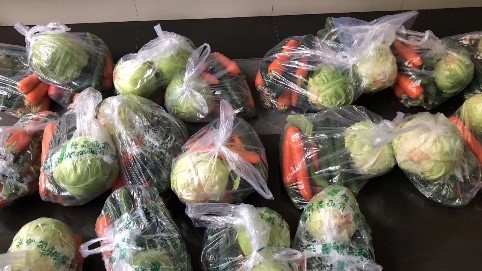
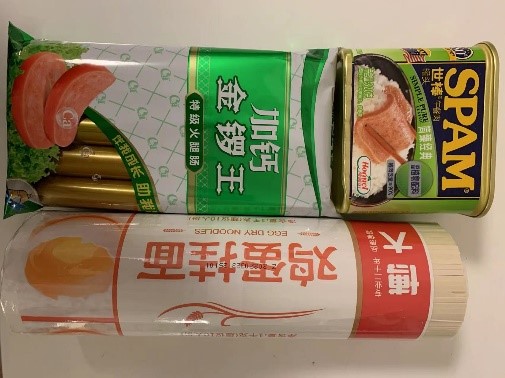
Cabbage, carrots, and cucumbers at the first distribution; dried noodles, Spam, and sausages at the second distribution. 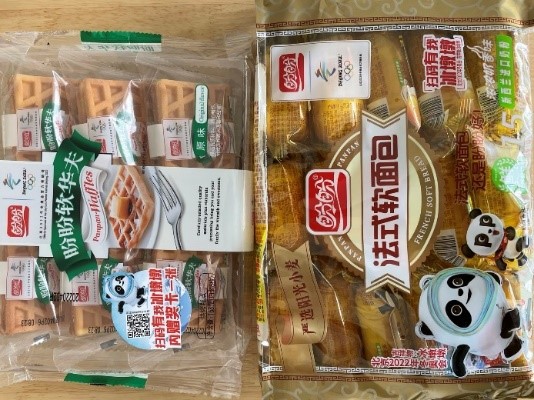
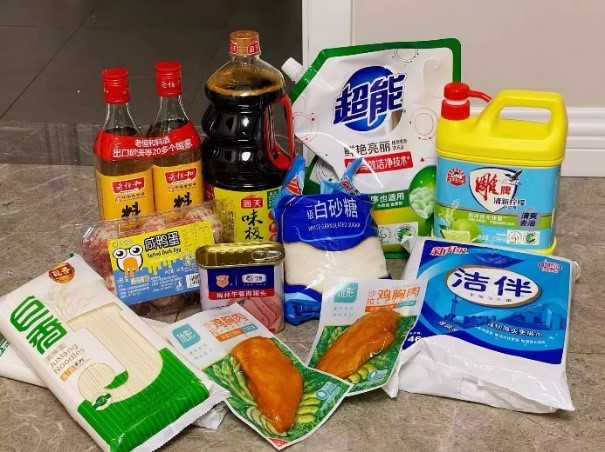
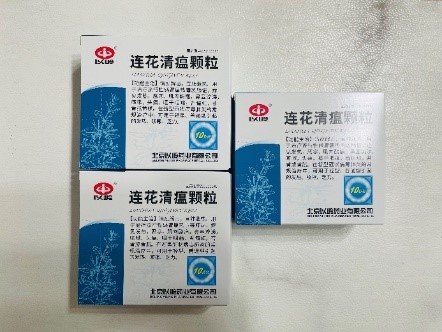
Baked goods, seasonings, household items, and medicines.
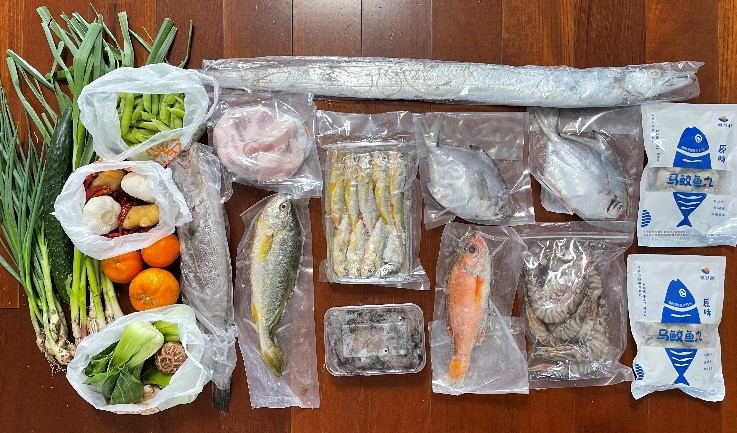
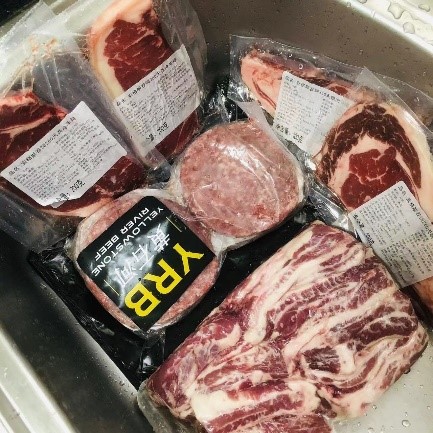
Some companies have made separate arrangements for relief supplies so that their employees can work without worry. Group Purchasing
Currently the most effective route for purchasing daily necessities. Bulk purchases are made by the community of the complex, with the community leader (leader of the group) negotiating with suppliers and coordinating the residents' orders via an app, and the goods are delivered in bulk to the complex a few days later. This was one of the things that changed with the blockade, as it was not a major purchasing route before the blockade.
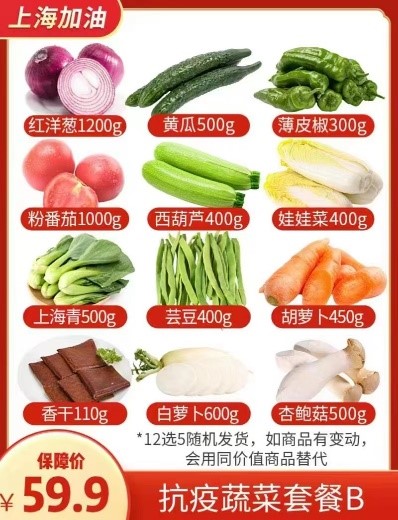
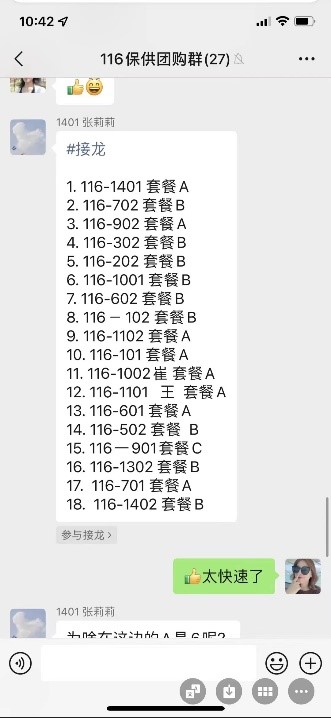
Examples of group purchases and order consolidation 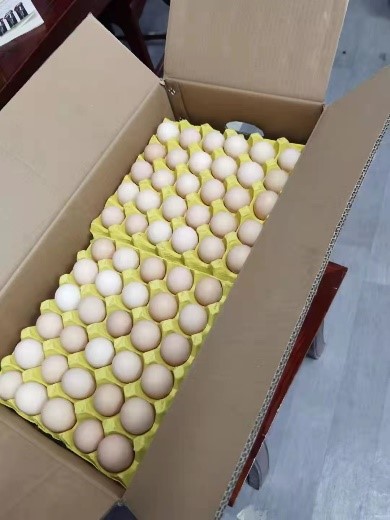
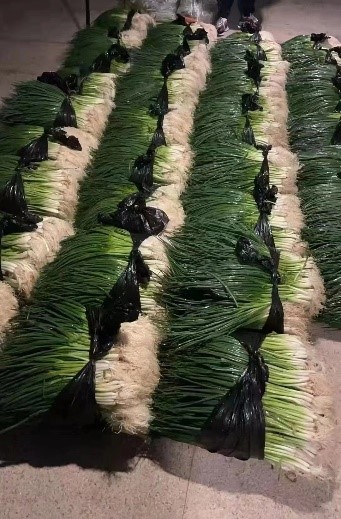
Delivery of goods for group purchase
Group Chat
Immediately after the blockade, Wechat groups were created in apartment complexes and condominium buildings to prevent the omission of PCR/antigen testing, and this led to a lot of interaction with the neighborhood residents. Bartering and sharing of goods and services are also taking place in these group chats amidst the difficulty in obtaining daily necessities. In addition, the community is actively helping each other by following up with households that have difficulty accessing information, such as seniors and foreigners, and by resolving day-to-day problems. Compared to before the blockade, the number of participating communities has increased, and ties with neighbors in particular have grown stronger.
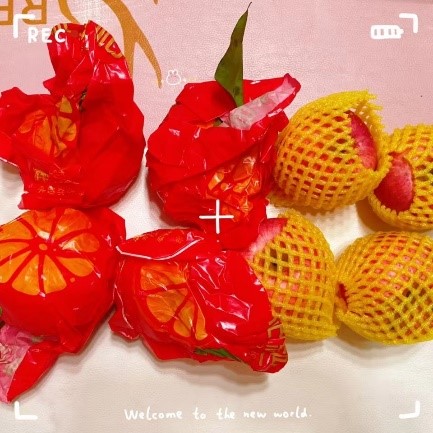
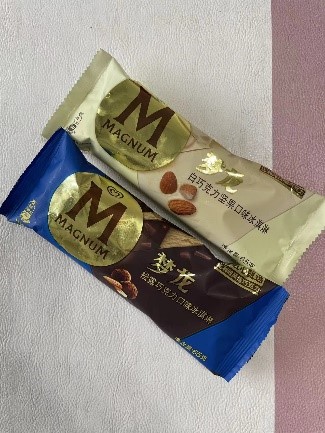
The author exchanged 1 bottle of soy sauce for 4 oranges and 4 apples, and 1 bottle of cola for 2 ice creams with a neighbor in the same apartment. Ingredients that are difficult to obtain
Foodstuffs that can be preserved are relatively easy to obtain, while leafy vegetables and fish that cannot be preserved are difficult to obtain. At one time, families that owned a lot of vegetables were considered “wealthy” and lettuce was said to be worth “chanel”. Many people began growing aromatic vegetables (leeks, garlic, ginger, etc.) because of the difficulty in obtaining them in the early days of the blockade. Coke and alcohol were difficult to obtain in the grocery, and many people craved them. 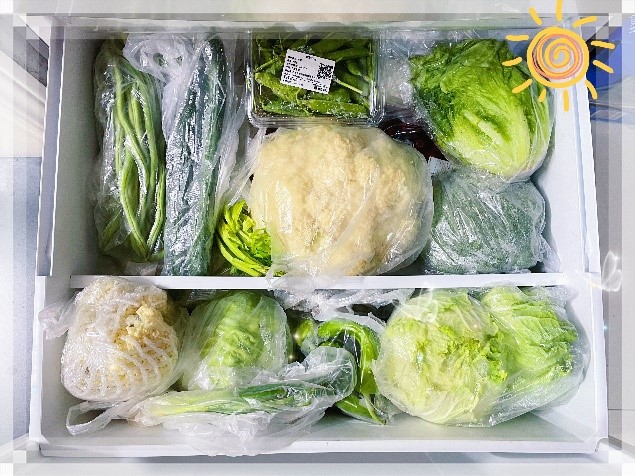
My family is one of the “wealthy” in a different sense 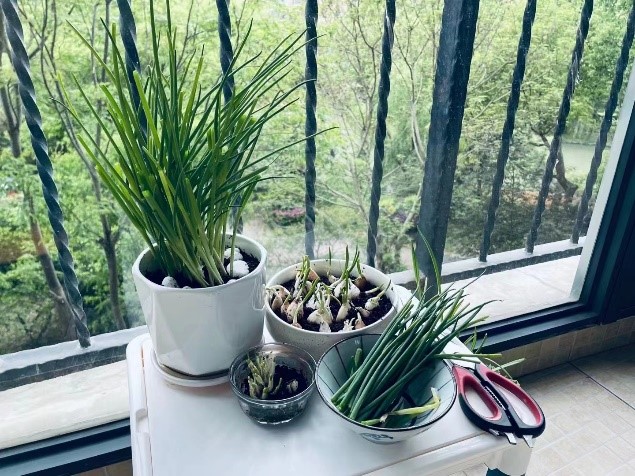
Acquaintance's home growing leeks and garlic sprouts
The joys of living in a closed-off area
This is similar in many ways to the self-restraint lifestyle in Japan. I enjoy hobbies such as video games and mahjong, remote live, remote training, remote disco…, and cooking such as making dumplings and breads. Communication with his family has also increased. Some people say that they look forward to PCR tests that allow them to take light walks while they are at it, and I think Shanghai residents can relate to this, albeit in a humble way. 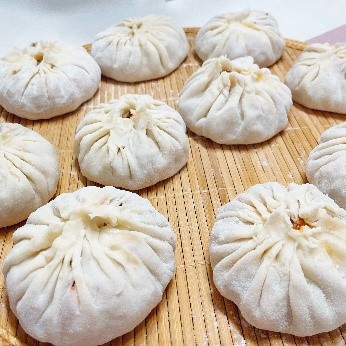
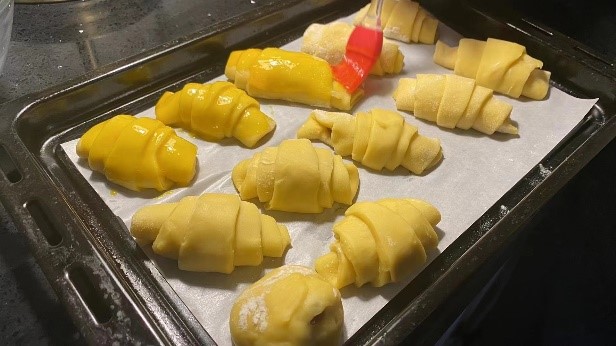
Making buns and bread 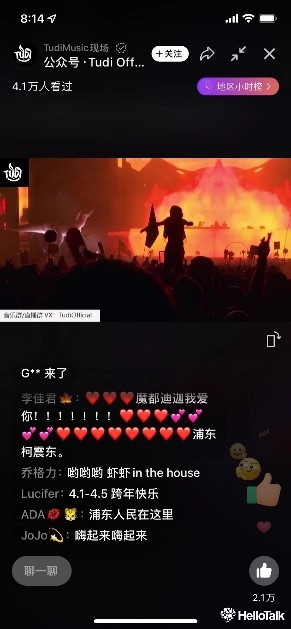
Participating in a remote concert Although the situation differs slightly depending on where you live, there is no doubt that life during the blockade is made possible by the community. Volunteers are also active in the community, and I am impressed and grateful for their hard work every day. Demand for stocks as crisis management
Even households that did not usually eat many vegetables have begun stocking larger quantities of vegetables in their refrigerators. Behind this shift are factors such as the idea of buying when items are available and the sense of security that comes from having stock on hand. In addition to food ingredients, demand for stockpiling has increased for condiments, beverages (such as water, milk, cola, coffee and other soft drinks, and alcohol), daily necessities (especially paper products and disinfectants), and medicines, as long as they can be obtained.
Compared with Japan, Chinese consumers have traditionally been more inclined to stock up, but in the past the main motivation was cost-related—buying in bulk was cheaper, or purchasing during sales events such as Double 11 (Singles’ Day) offered better value. After experiencing lockdowns, however, the primary motivation has shifted to preparedness.
What they want after logistics are restored
A big refrigerator, a freezer, a vegetable garden… This may be the voice of some, but it seems that many citizens share this as well. What they want to do after the blockade is lifted
Health consciousness has been growing in China, but junky foods such as hamburgers, grilled meat, cakes, milk tea, etc. are mentioned as things they would like to eat after the blockade is lifted. With the blockade preventing people from feeling spring, and with winter about to turn into summer all at once, the desire to go on a trip to experience the great outdoors is also very high. After the blockade is lifted, there will likely be some stress-relieving splurges for a while.
In the event of overstocking, demand for stocking up is likely to continue, as means have been created for sharing and private sales through the community. <Finally>
The blockade will eventually be lifted and life will return to normal, but perhaps the group purchasing route will take root, and the growing demand for stock will influence the brand switch of Shanghai people who love new products. It is unlikely that the community created this time will disband after the blockade is lifted, and the real-digital mix of interaction will continue.
Furthermore, the infection in China has spread not only to Shanghai but also to other cities, which may bring about a change in the mindset of the Chinese people.
Hopefully, by the time this column is published, the blockade will have been lifted in many districts…
If you would like to exchange the latest information on Shanghai (China) with an Intage China representative, please contact us
here.
-
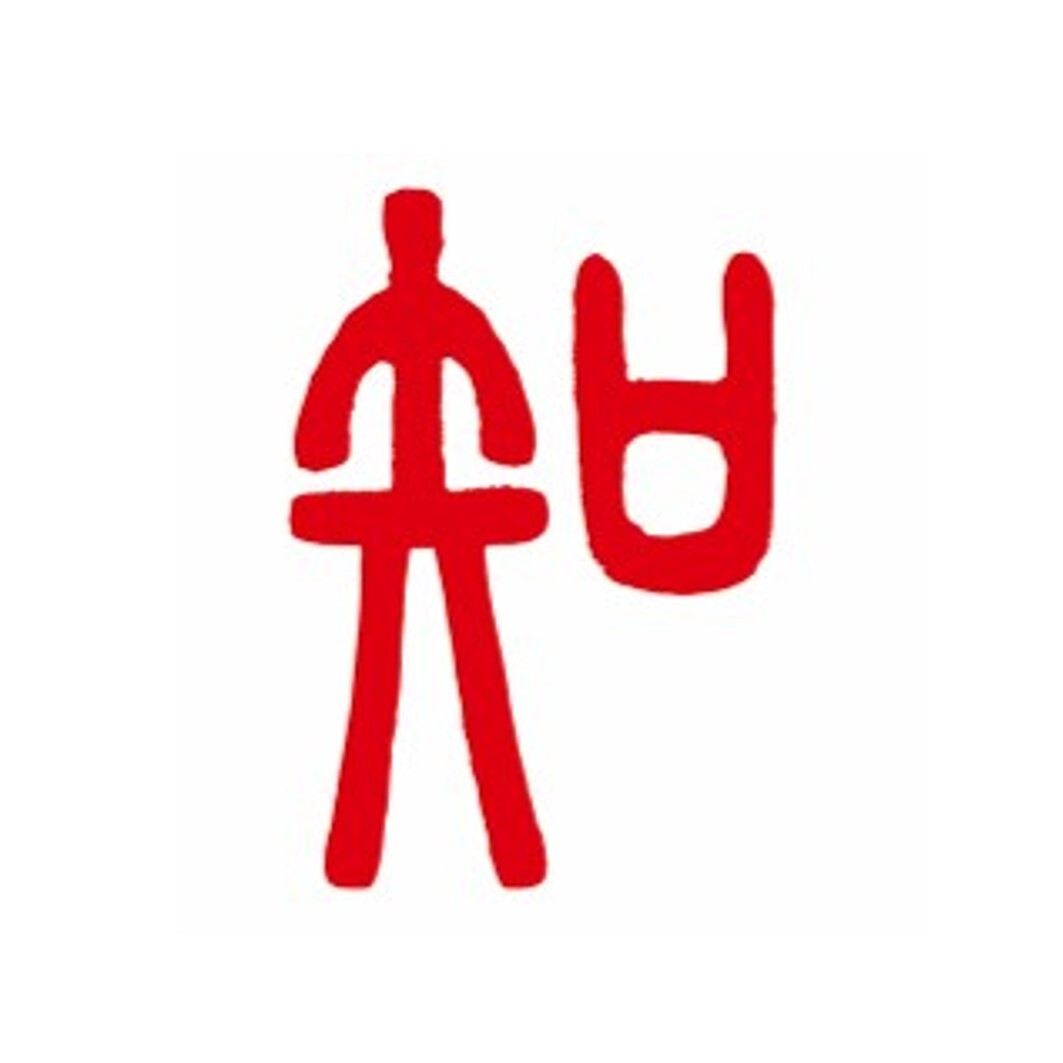
Author profile
Luo Na
Client Account Director, INTAGE CHINA. Chinese, graduated from university in Japan and joined INTAGE. She has 14 years of experience and is familiar with many research methods. Currently in Shanghai, she is in charge of Japanese companies operating in China, always striving to understand customer needs more deeply and to make precise proposals according to the issues.
-

Editor profile
Yuka Sekio
Joined INTAGE in 2007.Currently resides in Shanghai.She finds it interesting to encounter products he would never buy himself through rationing during the blockade.One of her recent concerns is that she only has two more rolls of toilet paper in stock.
The battle for food
This is what the citizens of Shanghai do best on a daily basis. Many people wake up early in the morning each day and begin by struggling with the application. Stores in general sell out as soon as sales start and close today within a minute. It is said that the success rate of ordering on an individual basis is less than 5%. Of course, you will never be able to buy all the items you wanted to buy because they are always sold out.


Relief Supplies/Rations
Supplies are distributed by the government on an irregular basis, varying from district to district. At the beginning of the blockade, the foodstuffs were minimal, but gradually the supplies became more varied




Baked goods, seasonings, household items, and medicines.


Group Purchasing
Currently the most effective route for purchasing daily necessities. Bulk purchases are made by the community of the complex, with the community leader (leader of the group) negotiating with suppliers and coordinating the residents' orders via an app, and the goods are delivered in bulk to the complex a few days later. This was one of the things that changed with the blockade, as it was not a major purchasing route before the blockade.




Delivery of goods for group purchase
Group Chat
Immediately after the blockade, Wechat groups were created in apartment complexes and condominium buildings to prevent the omission of PCR/antigen testing, and this led to a lot of interaction with the neighborhood residents. Bartering and sharing of goods and services are also taking place in these group chats amidst the difficulty in obtaining daily necessities. In addition, the community is actively helping each other by following up with households that have difficulty accessing information, such as seniors and foreigners, and by resolving day-to-day problems. Compared to before the blockade, the number of participating communities has increased, and ties with neighbors in particular have grown stronger.


Ingredients that are difficult to obtain
Foodstuffs that can be preserved are relatively easy to obtain, while leafy vegetables and fish that cannot be preserved are difficult to obtain. At one time, families that owned a lot of vegetables were considered “wealthy” and lettuce was said to be worth “chanel”. Many people began growing aromatic vegetables (leeks, garlic, ginger, etc.) because of the difficulty in obtaining them in the early days of the blockade. Coke and alcohol were difficult to obtain in the grocery, and many people craved them.

Acquaintance's home growing leeks and garlic sprouts
The joys of living in a closed-off area
This is similar in many ways to the self-restraint lifestyle in Japan. I enjoy hobbies such as video games and mahjong, remote live, remote training, remote disco…, and cooking such as making dumplings and breads. Communication with his family has also increased. Some people say that they look forward to PCR tests that allow them to take light walks while they are at it, and I think Shanghai residents can relate to this, albeit in a humble way.


Demand for stocks as crisis management
Even households that did not usually eat many vegetables have begun stocking larger quantities of vegetables in their refrigerators. Behind this shift are factors such as the idea of buying when items are available and the sense of security that comes from having stock on hand. In addition to food ingredients, demand for stockpiling has increased for condiments, beverages (such as water, milk, cola, coffee and other soft drinks, and alcohol), daily necessities (especially paper products and disinfectants), and medicines, as long as they can be obtained.
Compared with Japan, Chinese consumers have traditionally been more inclined to stock up, but in the past the main motivation was cost-related—buying in bulk was cheaper, or purchasing during sales events such as Double 11 (Singles’ Day) offered better value. After experiencing lockdowns, however, the primary motivation has shifted to preparedness.
What they want after logistics are restored
A big refrigerator, a freezer, a vegetable garden… This may be the voice of some, but it seems that many citizens share this as well. What they want to do after the blockade is lifted
Health consciousness has been growing in China, but junky foods such as hamburgers, grilled meat, cakes, milk tea, etc. are mentioned as things they would like to eat after the blockade is lifted. With the blockade preventing people from feeling spring, and with winter about to turn into summer all at once, the desire to go on a trip to experience the great outdoors is also very high. After the blockade is lifted, there will likely be some stress-relieving splurges for a while.
In the event of overstocking, demand for stocking up is likely to continue, as means have been created for sharing and private sales through the community. <Finally>
The blockade will eventually be lifted and life will return to normal, but perhaps the group purchasing route will take root, and the growing demand for stock will influence the brand switch of Shanghai people who love new products. It is unlikely that the community created this time will disband after the blockade is lifted, and the real-digital mix of interaction will continue.
Furthermore, the infection in China has spread not only to Shanghai but also to other cities, which may bring about a change in the mindset of the Chinese people.
Hopefully, by the time this column is published, the blockade will have been lifted in many districts…
If you would like to exchange the latest information on Shanghai (China) with an Intage China representative, please contact us
here.
-

Author profile
Luo Na
Client Account Director, INTAGE CHINA. Chinese, graduated from university in Japan and joined INTAGE. She has 14 years of experience and is familiar with many research methods. Currently in Shanghai, she is in charge of Japanese companies operating in China, always striving to understand customer needs more deeply and to make precise proposals according to the issues.
-

Editor profile
Yuka Sekio
Joined INTAGE in 2007.Currently resides in Shanghai.She finds it interesting to encounter products he would never buy himself through rationing during the blockade.One of her recent concerns is that she only has two more rolls of toilet paper in stock.
Demand for stocks as crisis management
Even households that did not usually eat many vegetables have begun stocking larger quantities of vegetables in their refrigerators. Behind this shift are factors such as the idea of buying when items are available and the sense of security that comes from having stock on hand. In addition to food ingredients, demand for stockpiling has increased for condiments, beverages (such as water, milk, cola, coffee and other soft drinks, and alcohol), daily necessities (especially paper products and disinfectants), and medicines, as long as they can be obtained.
Compared with Japan, Chinese consumers have traditionally been more inclined to stock up, but in the past the main motivation was cost-related—buying in bulk was cheaper, or purchasing during sales events such as Double 11 (Singles’ Day) offered better value. After experiencing lockdowns, however, the primary motivation has shifted to preparedness.
What they want after logistics are restored
A big refrigerator, a freezer, a vegetable garden… This may be the voice of some, but it seems that many citizens share this as well.What they want to do after the blockade is lifted
Health consciousness has been growing in China, but junky foods such as hamburgers, grilled meat, cakes, milk tea, etc. are mentioned as things they would like to eat after the blockade is lifted. With the blockade preventing people from feeling spring, and with winter about to turn into summer all at once, the desire to go on a trip to experience the great outdoors is also very high. After the blockade is lifted, there will likely be some stress-relieving splurges for a while.
<Finally>
The blockade will eventually be lifted and life will return to normal, but perhaps the group purchasing route will take root, and the growing demand for stock will influence the brand switch of Shanghai people who love new products. It is unlikely that the community created this time will disband after the blockade is lifted, and the real-digital mix of interaction will continue.Furthermore, the infection in China has spread not only to Shanghai but also to other cities, which may bring about a change in the mindset of the Chinese people.
Hopefully, by the time this column is published, the blockade will have been lifted in many districts…
If you would like to exchange the latest information on Shanghai (China) with an Intage China representative, please contact us
here.
-

Author profile
Luo Na
Client Account Director, INTAGE CHINA. Chinese, graduated from university in Japan and joined INTAGE. She has 14 years of experience and is familiar with many research methods. Currently in Shanghai, she is in charge of Japanese companies operating in China, always striving to understand customer needs more deeply and to make precise proposals according to the issues.
-

Editor profile
Yuka Sekio
Joined INTAGE in 2007.Currently resides in Shanghai.She finds it interesting to encounter products he would never buy himself through rationing during the blockade.One of her recent concerns is that she only has two more rolls of toilet paper in stock.
 Global Market Surfer
Global Market Surfer CLP
CLP